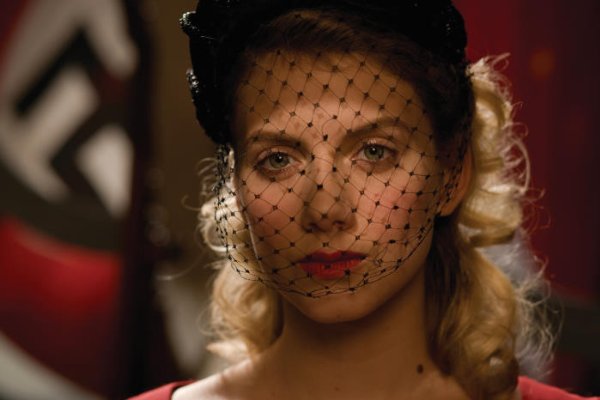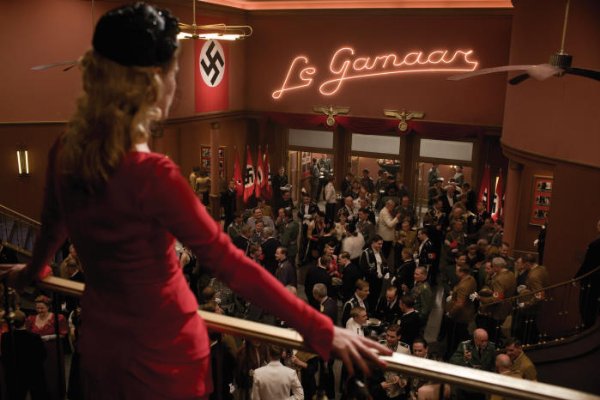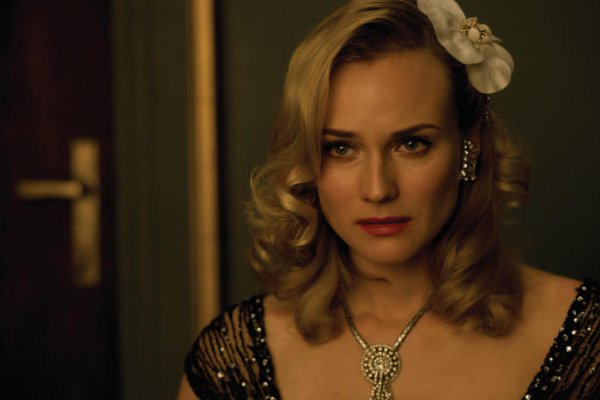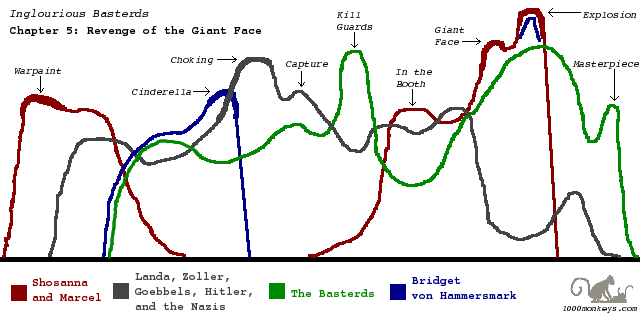Previously, we’ve looked at the first four chapters of Inglourious Basterds in the context of viewing it as a quadruple fugue. Now we come to the final chapter, where all four voices are present, and each achieves its resolution in what corresponds to Act III. Refer to the intro to “The Inglourious Fugue” for definitions of the terms I’m using and of the primary voices being examined.
Chapter 5: Revenge of the Giant Face
It’s the night of the premiere of Nation’s Pride, Goebbels‘s newest propaganda film, starring its subject, Fredrick Zoller. In the preceding two chapters, we learned of two separate plots to kill the Nazis who have assembled at the cinema: Shosanna and Marcel intend to burn it down with all of the Nazis inside, while Bridget von Hammersmark and the Basterds intend to blow it up.

Chapter 5 opens with Shosanna getting ready for the big night in a scene where Tarantino allows himself to indulge several of his favorite fetishes. As the beautiful French blond applies her makeup as if it were warpaint, re-establishing her voice in this chapter, “Putting Out Fire” blares over the soundtrack. (Not only does Tarantino use a song that was written 40 years after when his film takes place, but he uses the theme from a different movie, too. Pure balls… and it works.) Wearing her red dress, Shosanna dons a black veil and goes to survey her cinema, which the Nazis have liberally decorated. The red and black of her outfit makes her fit right in with their tapestries and posters that litter her lobby, and it also solidifies her as an extension of her cinema. She’s a captain prepared to go down with her ship.

Looking down over the cinema‘s lobby from the 2nd-floor balcony, Shosanna sees the arrival of most of the Third Reich high command: Goebbels, Goring, Boorman (with Hitler on his way). Then the Basterds, loosely disguised as Italian filmmakers, and Bridget von Hammersmark, her foot in a high-heeled cast, make their entrance. This is the first time in the piece when all four primary voices are present simultaneously, and the tension hangs thick in the air.
Col. Landa spots the scheming members of Operation Kino and approaches them in the lobby, once again asserting his voice above the din. After a comedic high point involving contrasting skills with the Italian language, two of the Basterds take their seats in the theater, elevating the dissonance of their voice in this chapter by moving their plan one more step forward. Landa takes von Hammersmark into the office, where we get another tense sit-down scene.  This one doesn’t last very long, though; as soon as the Cinderella moment—QT has a major foot fetish—confirms Landa‘s suspicions (justifying his belief in his own detective skills), he pounces on von Hammersmark with a motion that calls back to his strudel-stabbing in Chapter 3, silencing her voice for good and giving us our most intense look at just what Landa is capable of. This is the first time we’ve seen him involved in an act of violence since Chapter 1, and the first (and only) time it’s been Landa himself who did the killing.
This one doesn’t last very long, though; as soon as the Cinderella moment—QT has a major foot fetish—confirms Landa‘s suspicions (justifying his belief in his own detective skills), he pounces on von Hammersmark with a motion that calls back to his strudel-stabbing in Chapter 3, silencing her voice for good and giving us our most intense look at just what Landa is capable of. This is the first time we’ve seen him involved in an act of violence since Chapter 1, and the first (and only) time it’s been Landa himself who did the killing.
Riding an adrenaline high, the voice of his subject peaking, Landa orders his men to apprehend Lt. Raine, who is taken, along with Pfc. Utivich, to a tavern where the Germans have set up a base of communications.  Here the voice of Landa shifts its pitch, revealing that he is willing to allow the Basterds to go through with their plan, so long as he’s remembered by history as the hero behind it all. This is a different tone than the one we’ve become used to hearing from Landa, as exemplified by his contrasting attitudes towards his nickname (“The Jew Hunter“) between Chapter 1 and now. It’s also another instance of Landa demonstrating his prowess as a detective, a sub-theme of his subject that has surfaced a few times now, but never more forcibly than here. Revealing himself to not be as committed to the Nazi doctrine as he might’ve previously appeared, Landa sides with the cause of the Basterds to “end the war tonight,” and we see a brief flashback disclosing the fact that he planted Raine‘s bomb in the opera box where Hitler and Goebbels are seated.
Here the voice of Landa shifts its pitch, revealing that he is willing to allow the Basterds to go through with their plan, so long as he’s remembered by history as the hero behind it all. This is a different tone than the one we’ve become used to hearing from Landa, as exemplified by his contrasting attitudes towards his nickname (“The Jew Hunter“) between Chapter 1 and now. It’s also another instance of Landa demonstrating his prowess as a detective, a sub-theme of his subject that has surfaced a few times now, but never more forcibly than here. Revealing himself to not be as committed to the Nazi doctrine as he might’ve previously appeared, Landa sides with the cause of the Basterds to “end the war tonight,” and we see a brief flashback disclosing the fact that he planted Raine‘s bomb in the opera box where Hitler and Goebbels are seated.
From here it’s a frantic race to the climax. Back at the cinema, Sgt. Donowitz and Pfc. Ulmer spring into action. While they’re preparing their assault on the Hitler/Goebbels opera box, Zoller excuses himself to make another attempt at winning Shosanna‘s affections. He finds her alone in the projection booth, Marcel having already left to lock the doors to the theater and take his place behind the screen. In the booth, Shosanna and Zoller both meet their end in true spaghetti Western tragic fashion, but not before Shosanna has had a chance to switch to her “special” fourth reel.
Immediately after her death, Shosanna‘s voice reaches its apex, as she appears as a giant face on the screen, tormenting the theater full of Nazis with the information that they are all about to die. Marcel‘s voice gets its last flourish as he flicks his cigarette onto the stack of nitrate films, igniting the screen, with the rest of the cinema to follow. At the same time, the Basterds burst into the opera box and proceed to machine-gun the ever-loving shit out of Hitler and Goebbels, before turning their fire onto the crowd below, mirroring the actions of Zoller in Nation’s Pride shown only moments before. They also take the time to riddle the corpses of Hitler and Goebbels on the ground with more bullets, achieving a bookend effect with the slaughter of Shosanna‘s family under the floorboards in Chapter 1.
Amidst the chaos, the face of Shosanna is still visible in the smoke and flames that have taken the place of the screen, cackling as the theater full of Nazis scramble for their lives. The bombs of Operation Kino then go off, as the Kino voice peaks along with Shosanna‘s in victory. The cinema explodes, blowing the marquee off of the front, Shosanna‘s chorus giving its ultimate flourish.
The coda of Inglourious Basterds takes place in a forest at the Allied lines, where Landa will surrender to Raine and Utivich. Before allowing him to do so, though, Lt. Raine reprises his swastika-carving sub-theme from Chapter 2, as the voice of the film’s titular characters makes its final statement, and Landa‘s is finally silenced.




Okay, what I don’t get, and maybe you can help me with this, is why were the Basterds okay with leaving the bombs on their legs and blowing up with the Nazis? It doesn’t seem to go along with their voice from the rest of the movie. Since when do they become suicide bombers?
I thought they took the bombs off their legs and left them somewhere in the theater (I don’t remember for sure, though). It’s the bomb that Landa planted in the opera box that really gets them—not that it matters, of course, since everybody in the theater was going to die. I guess I thought they were mirroring Shosanna and Marcel’s plan to take everybody out with them. I think they also wanted to make sure that the plan went through, which is why they made their assault on the opera box.
I agree that thinking of them as suicide bombers gives their actions a different connotation (Landa refers to it as “a terrorist plot”), but I do think they were consistently portrayed as being fearless throughout the film, willing to do whatever it takes to help their cause, so it seems to fit to me.
I agree with the fearless part. But do you think Shoshanna and Marcel were planning to die along with everyone? I thought they planned to escape, but obviously once Zoller came up to the projection room, everything spun out of control for her.
Also, do you think the Basterds just got caught up in the moment of killing all the Nazis? Because I’d think that you’d want to live to tell the tale about the time you machine gunned the shit out of Hitler!
That’s a good point about the Basterds. They definitely have the crazy-eyes going on while they’re going nuts with the machine guns. Maybe they just couldn’t stop themselves in time to get out of there before the place blows.
I always thought that Shosanna and Marcel were just planning on going down with the cinema. Something about their scenes just felt to me like they knew they were about to die. You got me curious enough about it to check the screenplay. In the opening scene of Chapter 5, QT says (of Shosanna putting on her red dress), “This is the first time in her life she’s had the opportunity, or the occasion to wear something like this. Since she knows this is the last night of her life, no time like the present.”
Later, right before Marcel goes to lock the auditorium and take his position behind the screen, the script says this: “This is the last time they will see each other, too much to say. He holds her in his arms and lays a one kiss before I die wet one on her.”
I feel like that’s cheating, though; you should believe whatever you felt the film told you to believe when you saw it. (I’m quite certain QT would agree with me on that point!)